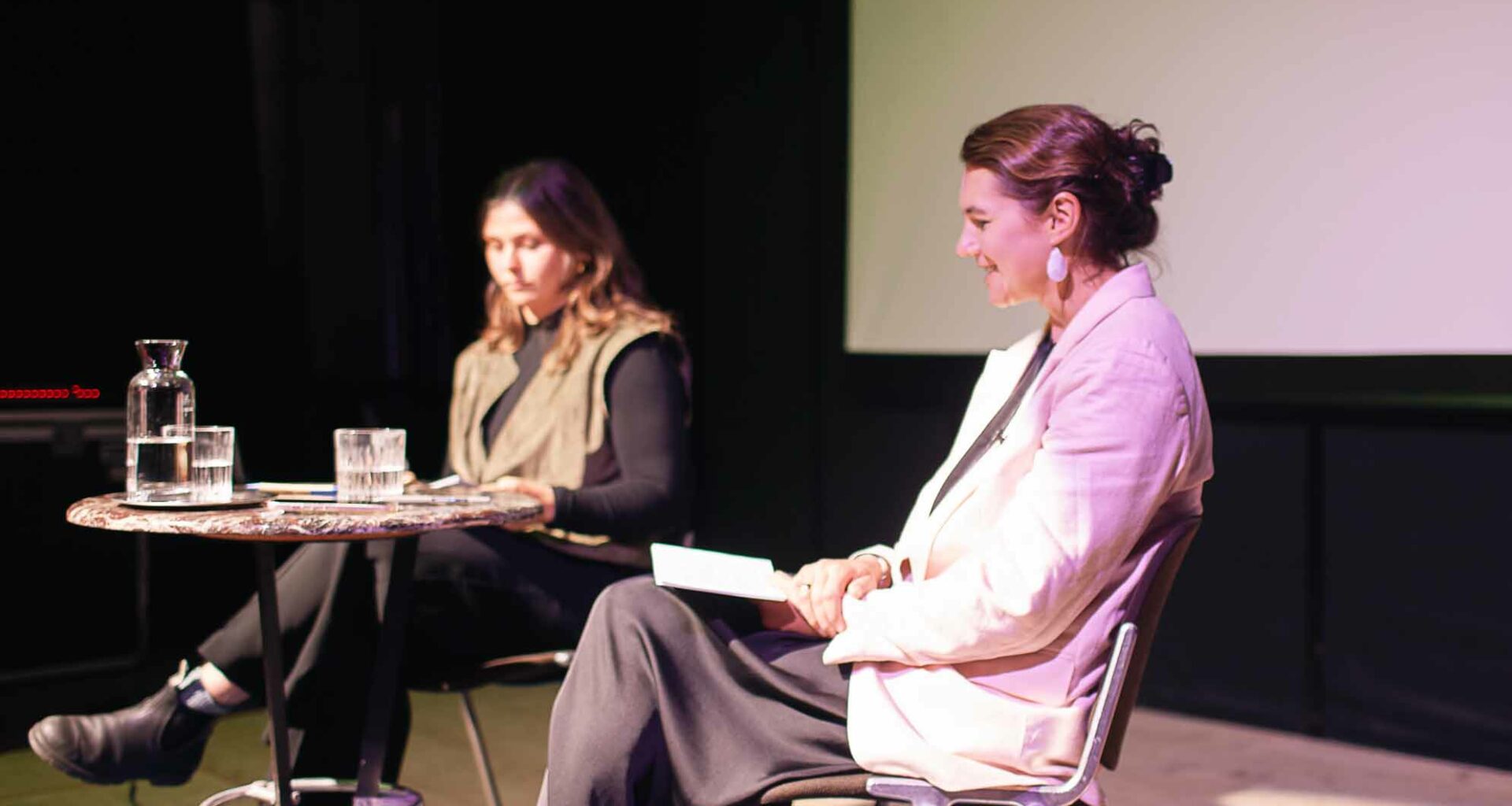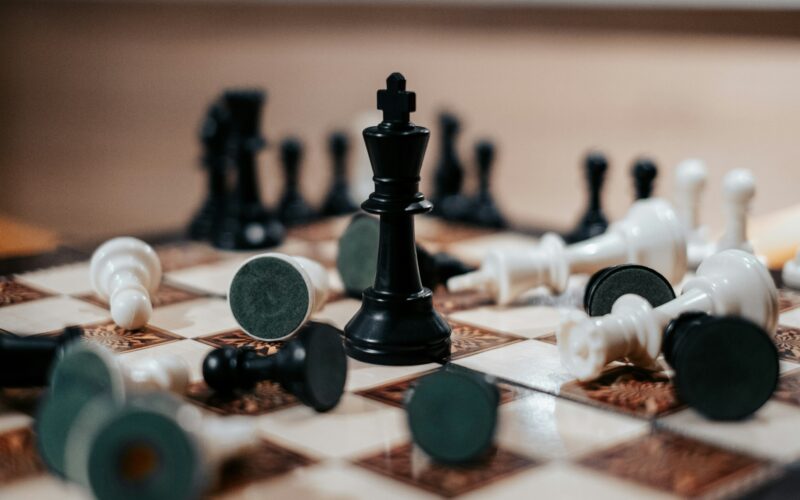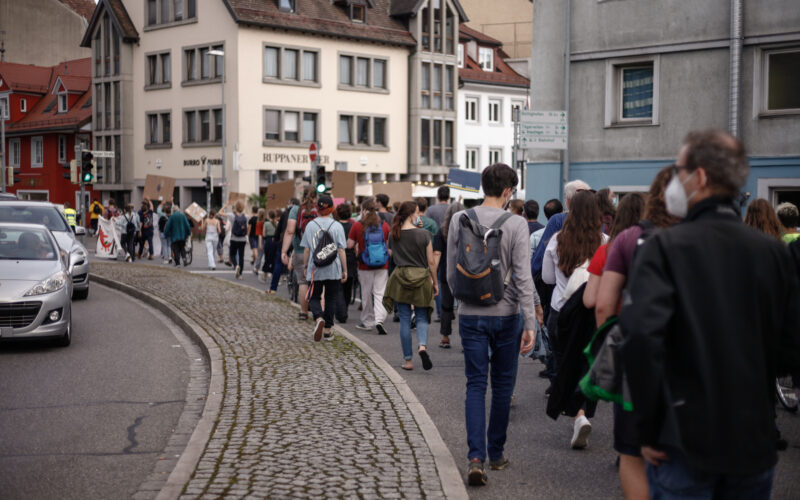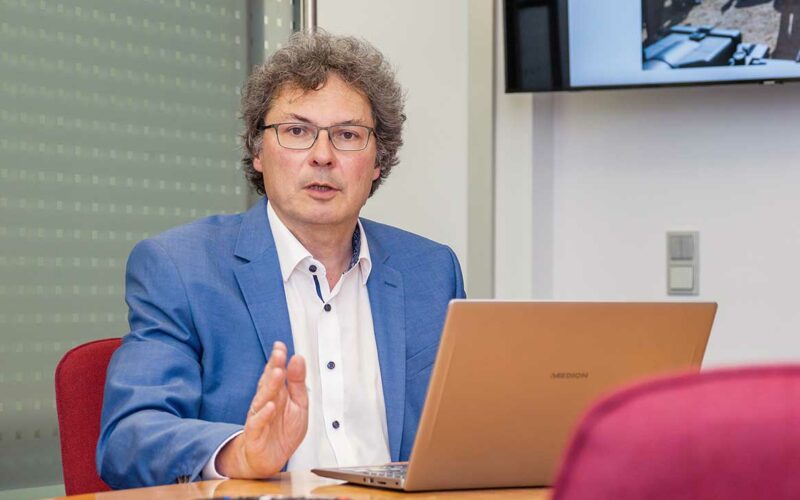- The documentary film „20 Days in Mariupol“ portrays the horrors of the war of aggression against Ukraine.
- We screened the one-and-a-half-hour film at the Apollo Kulturhaus on September 12, 2024, in English.
- Afterwards, we discussed the footage and the issues concerning the Ukrainian community in German and Russian.
- The discussion also touched on why so many people in Russia still unconditionally support Putin.
- It became clear that Ukraine is fighting for European freedom, not just for its own country.
- Overall, the Ukrainians present expressed a desire for more media attention and support.
- In our next focus at karla, we aim to give them exactly this attention.
Outside the Apollo Cultural Center, dusk is falling. The windows glow in neon colors1. But something is different on this evening of September 12th: a beach flag bearing the logo of karla stands outside the door, signaling the collaboration between the two institutions. Around 40 people have gathered in the former cinema hall, here to watch the film 20 Days in Mariupol. Tonight, we are showing the original version, in English, with the reporter’s voice narrating and Ukrainian voices speaking freely. Speaking for themselves.
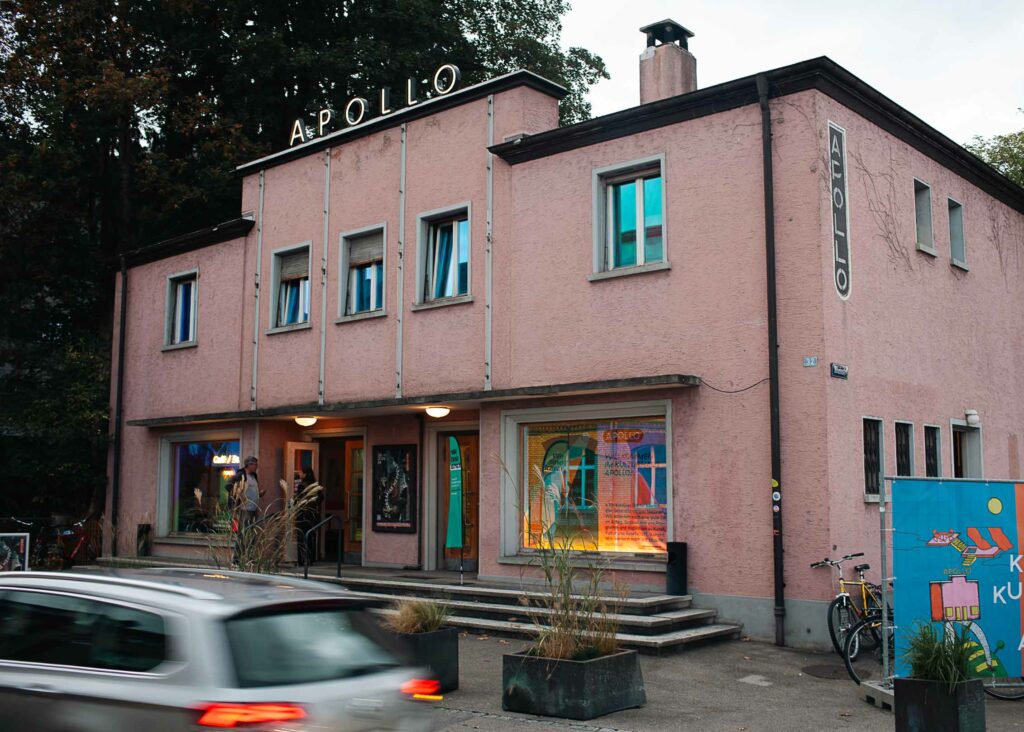
The images are powerful, gripping, emotional, and at times disturbing. They depict the brutality with which Russian President Vladimir Putin is waging war on the Ukrainian people. We see a maternity ward hit by a rocket, with a bloodied pregnant woman being carried out on a stretcher. We see mass graves. We see people who don’t know where to turn. We see how the reporter, at the last second, escapes with the help of the Red Cross, saving the film footage. The film was awarded the Oscar for Best Documentary in the spring of 2024.
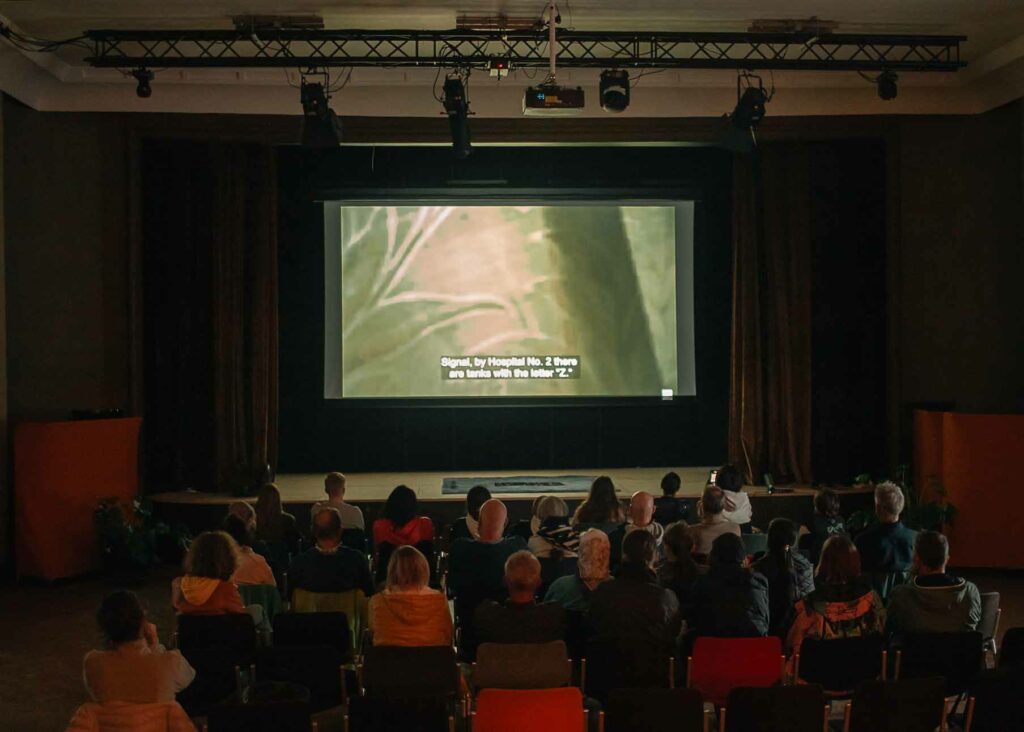
A Meeting in Perugia
I met Mystlav Chernov a year and a half ago at the International Journalism Festival in Perugia, Italy. I was sitting in the front row of a church, where he and a Ukrainian colleague spoke about the war and shared early clips from the film. Like many others in the audience, I was moved to tears. As a freelance foreign correspondent based in St. Petersburg, I regularly reported from Ukraine, especially between 2011 and 2015. I was there during the height of the Maidan protests.
I visited many cities beyond Kyiv – Kharkiv, Donetsk, Odesa, Lviv. Even Crimea, before it was occupied. Though I was never in Mariupol, the images of its destruction stand for the countless dead, the many wounded, and the unnumbered destroyed homes across this country. I have a special connection to Ukraine: I visited often and loved it, I admire the people, the culture, the language. But even those who have never been there will be touched by this film. If they aren’t, they must have no heart.
In the discussion in Perugia, Mystlav Chernov said he wished he had never had to make this film. But he felt it was important to capture every moment of those 20 days of occupation because it serves as a historical document. Something that his children and grandchildren can see, something that will last forever. Even when the war is over and the country is rebuilt, deep wounds will remain in the hearts of its people. And this film shows why.
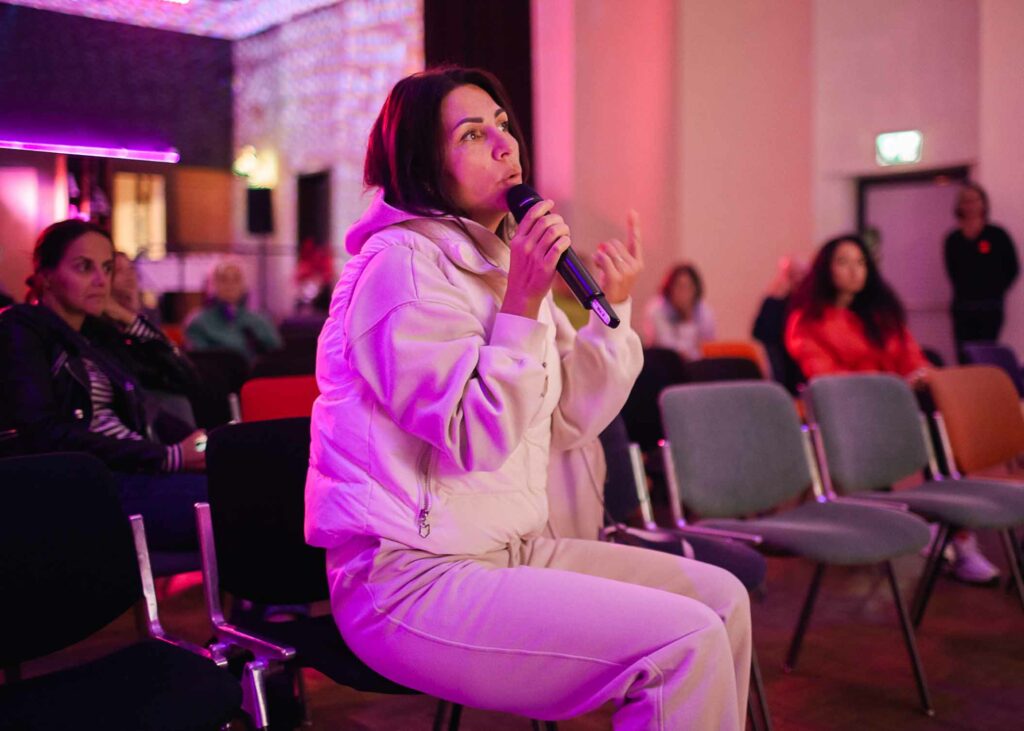
Looking Away is No Solution
When I told Barbara Haller from the Apollo Cultural Center that I’d like to show the film, she immediately said: “Let’s do it!” Even though it’s a difficult subject, it’s important to engage with it. To confront these images. It’s not always easy, and one is not always in the right mood for it. But looking away and pretending this has nothing to do with us is not a solution either. Or acting like it’s so far away: by plane, you can reach Kyiv in two hours. More than 1,500 Ukrainians now live in Konstanz – they make up the largest group of refugees.
My colleague Katrin Eigendorf, a special correspondent for ZDF whom I deeply respect, published a book a year ago titled Putin’s War – How the People of Ukraine Are Fighting for Our Freedom. She says Ukrainians are not just fighting for themselves, but also for us and a free Europe. And that if we don’t stop Putin, he might target other countries. I don’t share this view because we are part of NATO, and the alliance partners would ensure Putin doesn’t get far.
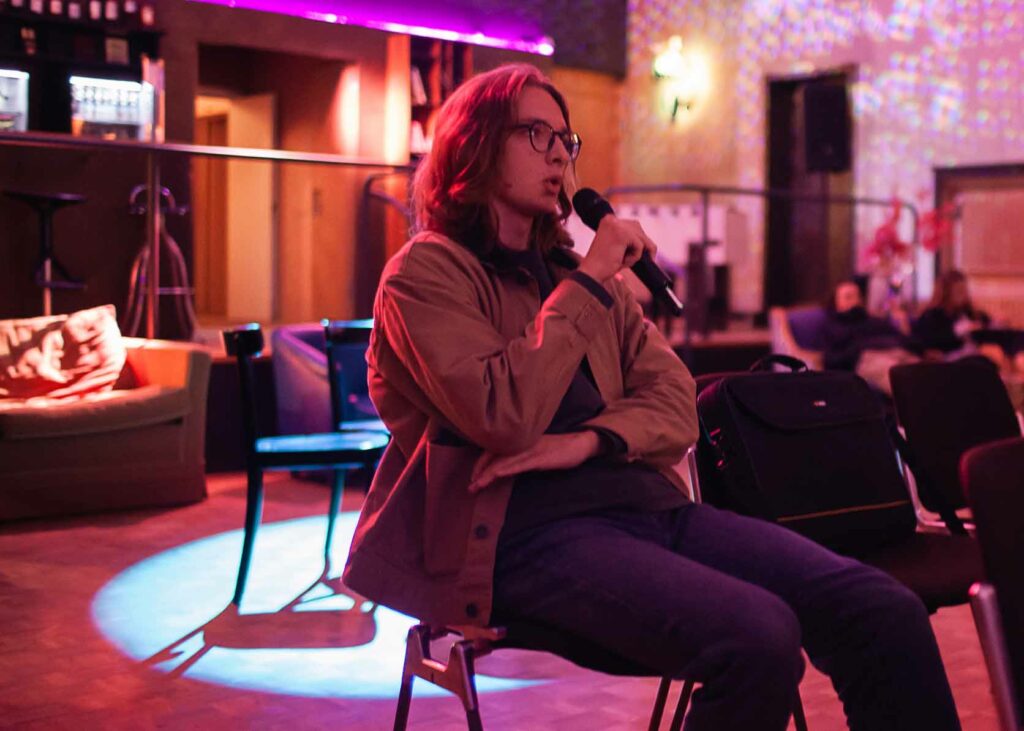
But this is what sets us apart from Ukraine: we are not alone. A young man from the audience said that Ukrainians can only rely on themselves and must fight because no one else will do it for them. And he’s right. Honestly, even Putin likely didn’t expect the Ukrainian people to show such resilience, or that the war would drag on for two and a half years. At first, it seemed like David against Goliath, with a clear outcome in sight.
But with support from the US and Europe, the war has lasted far longer than anyone anticipated. It’s also clear that if arms shipments to Ukraine were cut off tomorrow, all the bloodshed would be in vain, and Putin would illegally annex the country. This must be prevented. At the same time, calls for a diplomatic solution are growing louder. People, both in Ukraine and elsewhere, are weary of war and long for peace.
Why Does Putin Have So Much Support Among Russians?
In the discussion, the inevitable question arose: Why do people in Russia support Putin? The answer is complex, but there are several factors:
- 1. Many Russians, especially in rural areas with no internet access, get their information from television. The Kremlin controls the narrative, spreading lies and propaganda.
- Many dissenters have left the country. Hundreds of thousands have fled to places like Georgia, and there are many exiled Russians living in Berlin. This brain drain began long before the war, with intellectuals leaving the country over the years.
- The Russian economy benefits from the war, as grotesque as that sounds. According to ARD correspondent Ina Ruck, the war secures jobs and generates revenue, so ordinary Russians don’t feel any immediate negative impact.
- Of course, the many thousands of men who never return from the war are a consequence. But, in my opinion, this won’t reach a critical mass that will tip public sentiment or lead to an uprising.
- Many Russians prefer to avoid politics altogether, retreating into private life, vacationing in Sochi, and saying “politics is a dirty business” that they want nothing to do with.
- Families are sometimes split: young people follow independent media like Meduza and Dozhd online, while their parents watch state TV, leading to divisions that can seem insurmountable – even between relatives living in Ukraine and Russia.
- Russia is incredibly complex. With over 140 million people, there is no single Russian mentality. People in Vladivostok think differently than those in St. Petersburg or Rostov-on-Don.
- Many support Putin because there’s no alternative. Alexei Navalny was a beacon of hope, but we all know what happened to him. Putin also skillfully markets his successes, ensuring that many see him in a positive light.
- Those who protest the war, those who hold signs on the street, are arrested and sentenced to up to ten years in prison. They are made into examples to deter others from challenging the system.
- Even if Putin were no longer in power, say due to an assassination, the country wouldn’t immediately transform into a democracy. In his 24 years in office, Putin has built a network of loyalists who benefit from the system and would likely continue on his path.
During the discussion at the Apollo Cultural Center in Kreuzlingen, it became clear that the Ukrainians present don’t want this war of aggression to be forgotten. They want more coverage of their fears, struggles, and hopes during this turbulent time.
This is what karla magazine will focus on in the coming weeks and months. If you have any ideas or suggestions for potential topics, feel free to write to us: redaktion@karla-magazin.de
- Transparency note: This article was translated into English with the help of ChatGPT.
↩︎
Du willst mehr karla?
Werde jetzt Mitglied auf Steady und gestalte mit uns neuen Lokaljournalismus für Konstanz.
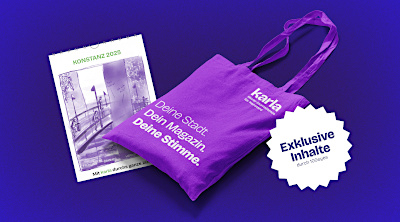
Oder unterstütze uns mit einer Spende über Paypal.![]()
